Oakley, a community of mostly modest, working-class homes flanking both sides of Fairview Road, has no central business district. Neither are there social hubs, such as coffee shops or restaurants, to give it the bustling vibrancy of some other Asheville locales. But on any given Thursday in the warmer months, the little neighborhood busts out its own unique, food-centered version of a block party in the parking lot behind the stately old Oakley United Methodist Church: the Oakley Farmers Market.
A celebration of locally grown food and neighborhood relationships, the market and the adjacent Oakley Community Garden are giving a much-needed boost to a predominantly low-wealth community that the U.S. Department of Agriculture considers a food desert (an urban area with limited access to good-quality, fresh food).
On market days, that parking lot and garden are the beating heart of Oakley. Children gather on a blanket under the chestnut trees to hear stories and sing songs with the local librarian. Moms and dads pushing strollers stop and chat with farmers under brightly colored canopies. Neighbors share a laugh over cups of freshly churned strawberry ice cream, tapping their toes to a bluegrass tune picked out by that day’s featured musician. Everywhere there are smiles and conversations, dogs being petted, kids having fun.
Everywhere there is connection.
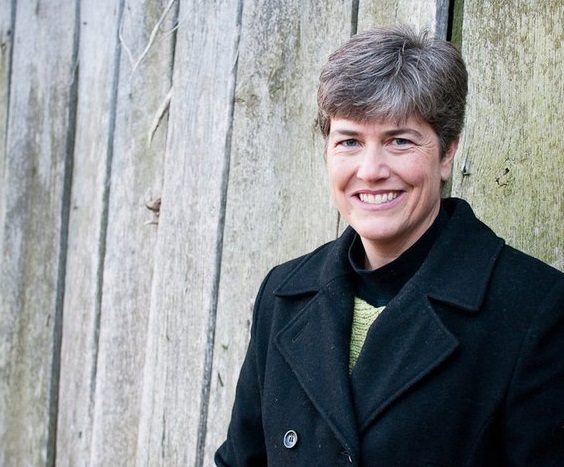
Community Instigator: Shelly Webb, a self-described “community instigator,” initiated the Oakley Farmers Market by posting a call to action on a church marquee. (Photo courtesy of Shelly Web)
Sprouting the seed
The market, now poised to begin its third season, was launched in 2012 by a group of Oakley residents who decided that the only way to improve their neighborhood was to jump in and get their hands dirty. But what brought them all together was a sign — a church sign.
“It was the dead of winter,” former pastor Shelly Webb recalls, “and I put up on the marquee, ‘Interested in an Oakley farmers market?’ and I put a date up there to organize. And that’s when all these people showed up.”
The diverse mix included young parents, business owners, professionals and even a farmer or two, all of them living within walking distance of the church. And they all came hoping to create something fresh and vital in a neighborhood that no one seemed to pay much attention to.
Webb, a self-described “community instigator” who’s now the director of Sharing House in Brevard, arrived at Oakley UMC in 2010. The following year, she started the community garden. During a memorial service for murdered children Jiya and Piya Patel, it dawned on her that neighborhood residents were craving a way to reach out to one another.
“I thought, we have all this land: Why don’t we just plow it up? And that worked. And then I thought, we have this big parking lot that our church folks don’t use much … and when I went down there, I could just see the farmers market,” Webb says. “It was like a kind of vision … and I knew people moving into our community cared about simplicity, cared about healthy eating and sharing stories and seeing one another once a week.”
Webb was also deeply concerned about Oakley’s food-security issues. And having read that 80 percent of the students at Oakley Elementary received some kind of food assistance, she decided to write a grant that addressed both food and spirituality. “For me, spirituality meant creating a community where everyone feels beloved, where everyone feels their human value is worthy of being known,” she explains. “So the grant was really just a mission of feeding people and offering something to those who were underserved. I thought, why can’t we bring fresh food to this neighborhood?” About $1,000 of the $20,000 grant from the Royce and Jayne Reynolds Foundation was used for the market; the rest went to other projects (including a shed for the community garden).
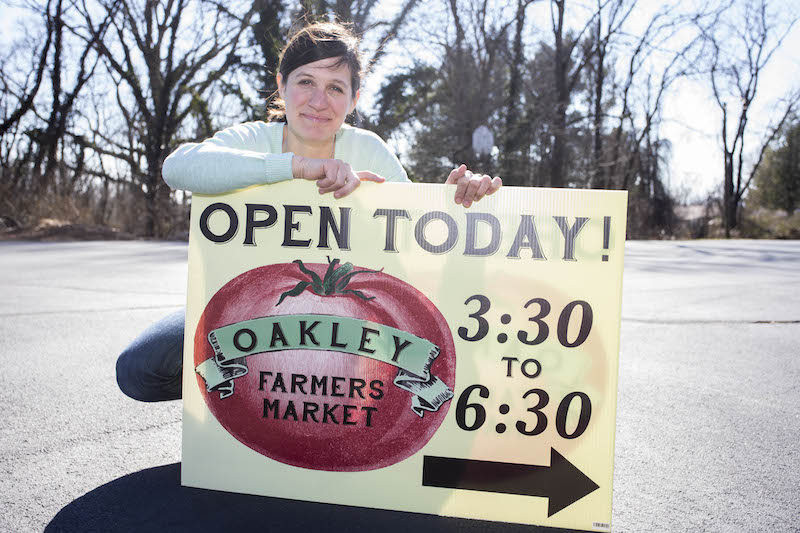
Sign of Growth: The Oakley Farmers Market just rolled out a new logo and bought new signs, which manager Carly Esslinger will place on Fairview Road each market day starting in May to draw attention to the market’s off-street location. (Alicia Funderburk / Mountain Xpress)
A growing idea
One of the folks who showed up at that first meeting was Carly Esslinger. A small-business owner whose son attends Oakley Elementary, she was hired as the market’s manager early in the inaugural season. But even before Esslinger began getting paid for her work, she’d invested major volunteer hours in helping get the project off the ground.
Esslinger, who’s lived in Oakley for eight years, is vocal about her love for the neighborhood despite its idiosyncrasies. “As soon as I saw that sign on the marquee, it was like the sky opened up,” she recalls. “It was like somebody was putting a gift in my lap. I thought, this is exactly what we need. I never second-guessed it.”
And beginning with that initial meeting in the church fellowship hall, Esslinger took it upon herself to keep things organized, taking notes and assembling a contact list. She began reaching out to potential vendors, started networking with other markets and reached out to the Appalachian Sustainable Agriculture Project for guidance.
Other committee members also lent their skills to the cause. Information technology specialists Kevin and Leigh-Ann Heuer set up email accounts and created a Web presence for the market. Urban planner Josh O’Conner led the push to get the necessary permits and drafted a working map of the space. Farmers Jeff and Debbie Weaver of Oakley’s Gladheart Farms offered a vendor’s perspective on the ins and outs of markets. Empowerment coach and organizational consultant Essie Silvers kept things running smoothly.
“I didn’t know if we could get it started that spring,” says Webb, “but by May we opened up. It was like the right people showed up with their many and varied gifts; people who had a lot of energy and experience.”
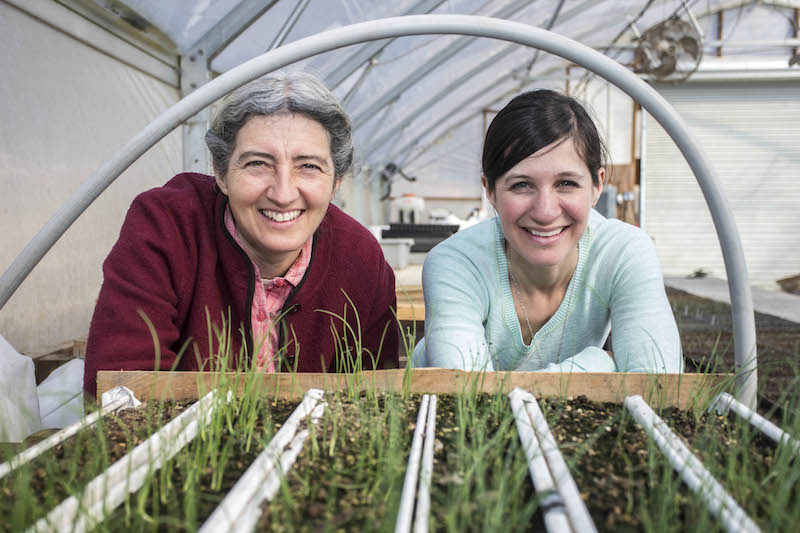
Community Nurtures: Debbie Weaver, left, of Gladheart Farm in Oakley, and Carly Esslinger, right, were among the small group of people who helped get the Oakley Farmers Market off and running. (Alicia Funderburk/ Mountain Xpress)
Rocky soil
With the church providing a free space and Webb’s grant for seed money, the market had a good start, but there were plenty of bumps in the road. “It was somewhat cost-prohibitive starting a market with a group of volunteers,” O’Conner remembers. “I think we were somewhere in the $300 range with permitting. But then we found we couldn’t have certain things, like food trucks and prepared food.”
That first season, they set up a meeting with Asheville City Council member Gordon Smith to discuss regulatory issues that were creating obstacles; continued dialogue with city officials has yielded positive results. “Last season there was an increase in permitting fees,” notes O’Conner. “We went to the city and asked them to reduce those, and they reduced fees for farmers markets across the board. … We’re also regulated as a fruit-and-vegetable market, which didn’t allow us to have food trucks. We worked that out over the winter, and now we’re able to get those in.”
Rounding up vendors, says Esslinger, “was discouraging in the beginning. I quickly began to see how thinly stretched most vendors are because they’re already in so many markets. The biggest challenge was finding produce vendors, and that continues to be a struggle.”
By the second season, however, Esslinger had figured something else out. “I learned that our market is a great place for startups. It’s hard for startups to get into established markets, and it’s hard for startup markets to get established farmers, so I started to see that this is how I need to sell this market. When people approach me who are first getting started, I say, ‘We are your place to grow; we can grow together.’ That’s been huge.”
Currently there are 13 member vendors, and Esslinger expects to add a couple more by the time the market opens in May.
A problem that’s been harder to solve is the lack of visibility. Oakley UMC’s parking lot is tucked behind the church, well back from Fairview Road. And though Esslinger and other market organizers spend considerable energy and money on temporary signage that must be removed at the end of the day, city codes severely limit their ability to highlight the off-street location.
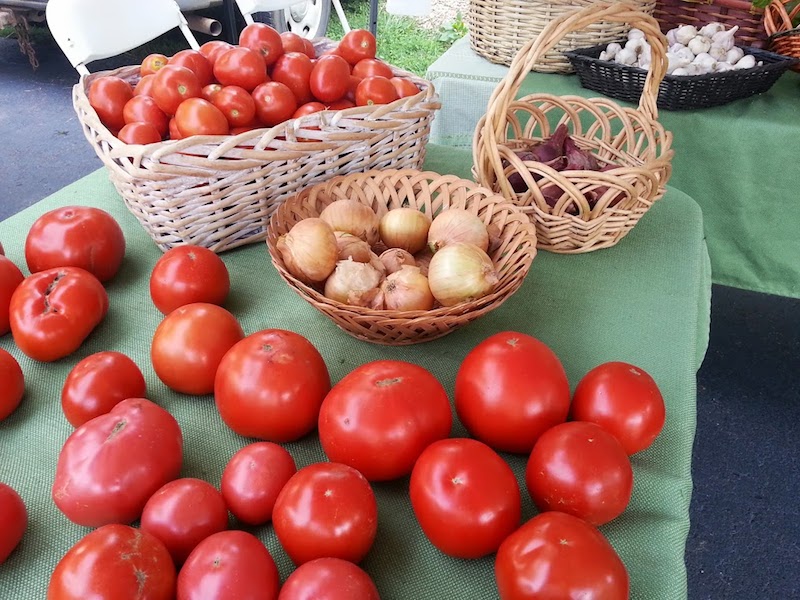
A kind of vision: “I knew people moving into our community cared about simplicity… cared about sharing stories and seeing one another once a week,” says Oakley market members Shelly Webb. (Photo courtesy of Oakley Farmers Market)
Blossoming
One way to get around that is simply to embrace the situation. Board members who are parents immediately recognized the value of not being on the main drag. Bordered by the community garden and plenty of green space, the Oakley UMC parking lot offers a protected area where children can play.
Accordingly, the group invested in swings and a sandbox, bought toys and craft materials, began planning weekly children’s activities, and adopted the slogan “Asheville’s kid-friendly market.” A partnership with the Oakley/South Asheville Library offers storytelling under the chestnut trees on market days from August through October, and firefighters from the nearby Oakley fire station frequently come with their trucks to make presentations.
Although the market still struggles with maintaining a steady flow of customers, averaging about 100 on a typical Thursday, its kid-friendly approach has definitely met with success. “I think people come from other parts of Asheville for the story time,” says Oakley resident Anne Johnston. “I love that my kids are getting to know the vendors. Once one of the bakers didn’t have [my son’s] favorite cookie and he was upset about that, so they made sure they had it next week. There’s a relationship happening: It’s not just buyers and sellers.”
Marita Renner, who lives about a mile from the market, agrees. “I take my 5-year-old almost every week and let him pick out veggies,” she says. “He especially loves the sweet red peppers that come in mid-to-late summer. He knows some of the vendors and makes his way around greeting them. He likes the kids’ activity table and loves it when the Oakley firefighters bring their firetruck down.”
“That’s the part of the market that, for me, goes beyond the food aspect of it,” says Esslinger. “It’s a sacred place in the community where people can safely congregate and just hang out.
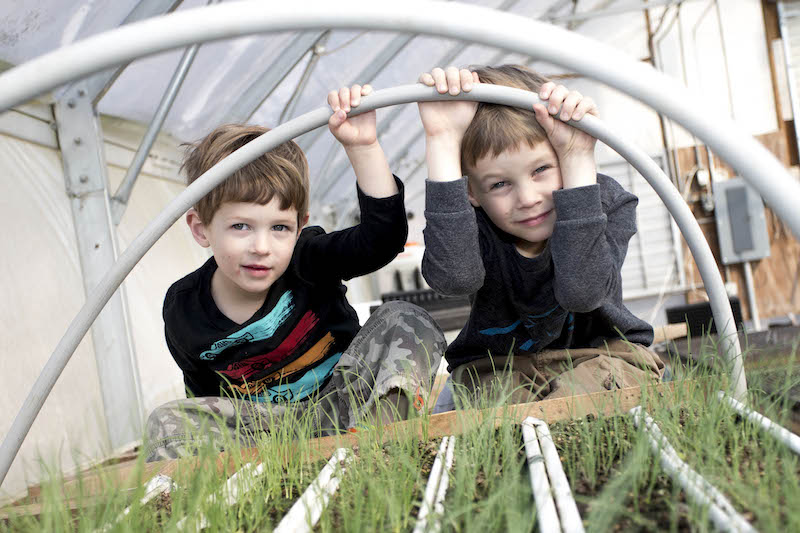
Sprouts: According to Oakley Farmers Market Manager Carly Esslinger, her sons Emil, left, and Rowyn, right, love seeing their neighbors and vendor friends at the market each week. (Alica Funderburk/ Mountain Xpress)
Bringing in the harvest
So is the market fulfilling its two-pronged mission, building community and alleviating food insecurity?
It’s definitely strengthening the neighborhood, says Rick Schilling, Oakley UMC’s current pastor. “It’s a great gathering place for the Oakley community. I hope more people will come out and see that there’s stuff to do in Oakley; they don’t have to travel to other places in Asheville. They can just come and hang out on a nice Thursday afternoon and catch up with their neighbors and do their shopping at the same time.”
Peggy Whisnant, who grew up on her family’s farm in Reynolds, joined Oakley UMC as a teenager back in the 1950s. She feels that both the market and the community garden are good for Oakley and for her church, whose shrinking membership is now mostly elderly Oakley residents. “Families don’t come like they used to,” she notes. “It’s a rarity now, and it makes me sad. I go to the market on Thursdays; I love the vendors. It’s sort of festive to see the people gathered there in the parking lot, and it does your heart good to see the neighbors down there working [in the community garden].”
Webb echoes those sentiments. The market, she says, has brought life back to both the community and Oakley UMC. “It made me feel overjoyed when I would see some of the older Oakley residents communicating and sharing stories with some of the newer residents. … To me that was a vision of shalom, of peace; it was very healthy.” Starting the market, says Webb, “wasn’t about bringing in church members but about being a vital congregation out in the community, and to that end we really succeeded. We met our neighbors; we shared love in the parking lot.”
Many vendors, too, say that despite the market’s unsteady traffic, the lively community spirit makes the whole thing worthwhile, even if they earn less.
“I really love that market,” says vendor Aradhana Silvermoon, who owns Silvermoon Chocolate. “It’s not super busy, so it’s fun hanging out and being outside; there are lots of kids running around,” she says. “Plus I love the other vendors and the feeling of camaraderie we have, especially on the slow days. On days I didn’t come home with a lot of money, I came home with eggs and mushrooms and other stuff, and that feels good.”
Esslinger, however, concedes that so far, the market has fallen somewhat short in terms of bringing fresh, healthy food to Oakley’s low-income residents. One big reason is the market’s inability to accept Electronic Benefits Transfer cards from the Supplemental Nutrition Assistance Program — something they’ve been trying to set up since their first planning meeting.
“Not having EBT is a big handicap,” says Esslinger. “I’ve actually seen people show up, then never come back again because they think things are just too expensive for them to afford without that assistance.” The market, she says, should have everything in place to accept SNAP EBT before the end of the 2014 season.
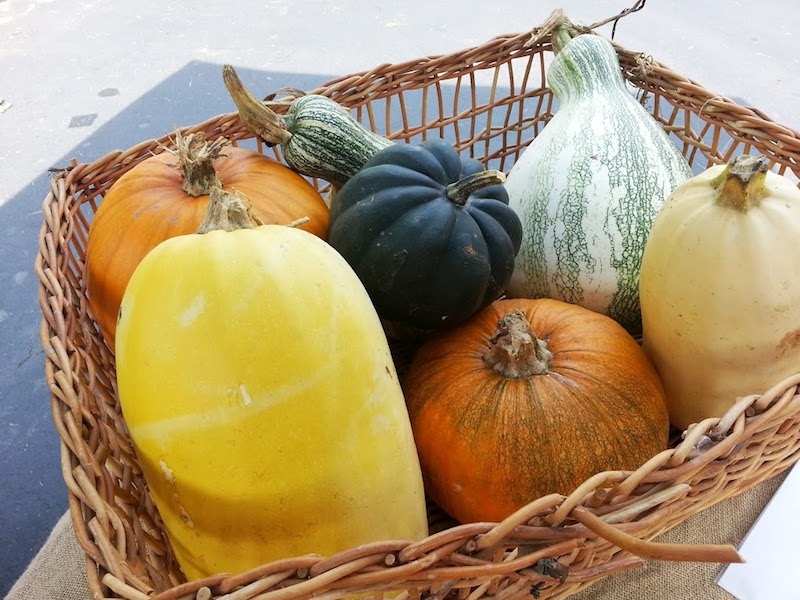
Something worthwhile: Volunteers have spent hundred of hours putting the market together but say the effort was worth it. “We are so happy this is here,” says Esslinger. (Photo courtesy of the Oakley Farmers Market.)
Fruits of their labors
The core volunteers have put in hundreds of hours of work over the last two years to make the market happen. Committee members, says O’Conner, contributed well over 200 hours just between the first meeting and the market’s launch — but they all seem to agree that it’s been worth the effort.
“I feel that it was definitely worth the time and energy, just for my own education,” O’Conner says. “The amount that I’ve learned just in my short time with the market has shown me how disconnected our whole food system is, from both a production and an equity standpoint.”
Esslinger, meanwhile, says: “I feel good going forward. It keeps me going that I’ve had so many people say, ‘We are so happy this is here.’ I’m getting just as much out of it as if I was a customer coming in.”
Webb, too, says she feels blessed about being a part of the group that brought the market to life. “It was just this great experience of watching community evolve without a preconceived idea of exactly how everything would go,” she observes. “I would never have guessed that people would show up at a meeting with those kinds of gifts, or that together we could create a great event that has lasted, that wasn’t just a flash in the pan.”
For more information visit oakleyfarmersmarket.com.
Gina Smith serves on the Oakley Farmers Market board of directors. On Thursday afternoons, May through October, she can be found hobnobbing with her neighbors and her vendor friends in the parking lot behind Oakley United Methodist Church. For more information on how to start a community farmers market, see Gina’s accompanying story “Tips for Starting a Farmers Market.”



Before you comment
The comments section is here to provide a platform for civil dialogue on the issues we face together as a local community. Xpress is committed to offering this platform for all voices, but when the tone of the discussion gets nasty or strays off topic, we believe many people choose not to participate. Xpress editors are determined to moderate comments to ensure a constructive interchange is maintained. All comments judged not to be in keeping with the spirit of civil discourse will be removed and repeat violators will be banned. See here for our terms of service. Thank you for being part of this effort to promote respectful discussion.